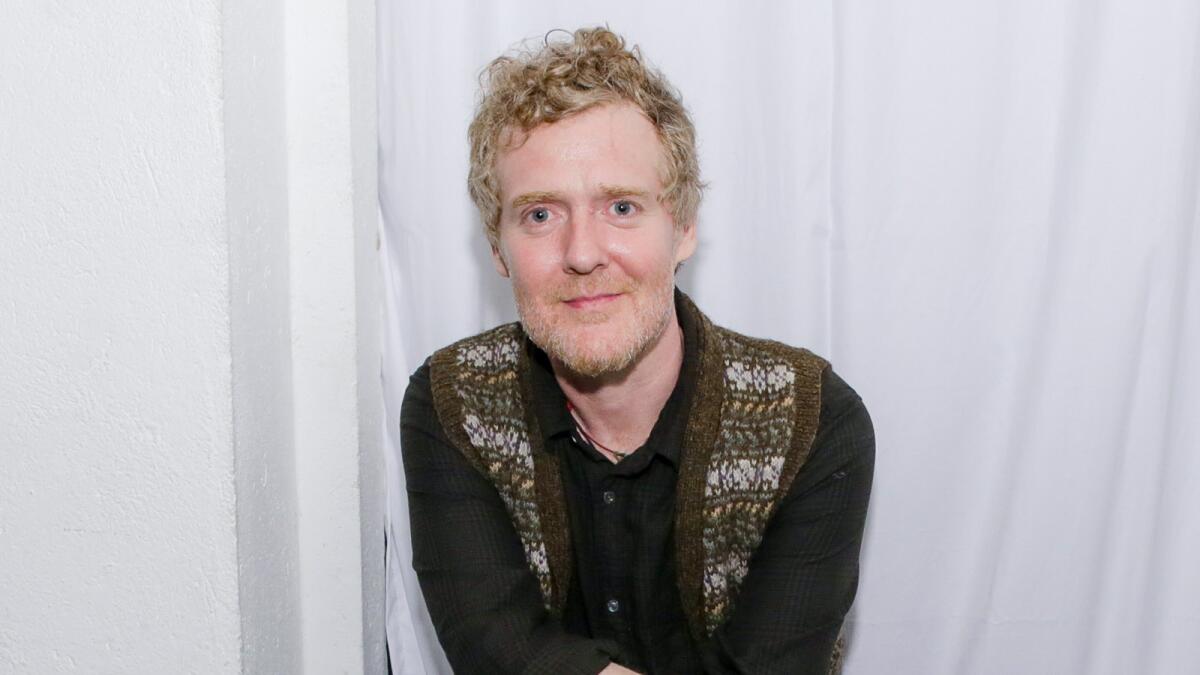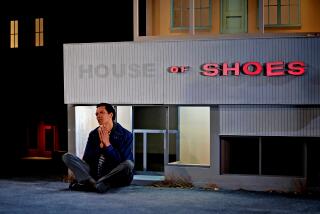For Glen Hansard, opportunity knocks more than once

Glen Hansardâs doubly blessed musical life will be doubly displayed Aug. 10 at two of Hollywoodâs most famous venues.
The Irish singer-songwriter will be headlining at the Hollywood Bowl, backed by a lavish 13-piece folk-rock ensemble with strings and horns. While he waits to go on, a mile away the touring company of the Broadway musical âOnceâ will nearing its final bows at the Pantages Theatre, capping a four-week run (itâll continue with a week at the San Diego Civic Theatre and a two-week engagement starting Aug. 19 at the Segerstrom Center in Costa Mesa).
Hansard, 44, owes his stardom to the original, 2006 iteration of âOnceâ as an ultra low-budget film. A former bandmate, John Carney, wrote and directed it, giving Hansard and his then- musical and romantic partner Marketa Irglova the lead roles, which included writing and performing the songs that carry the film. The movie and its Oscar-winning ballad, âFalling Slowly,â made them stars, and the stage version that opened on Broadway 21/2 years ago won eight Tony awards, including best musical. It has earned nearly $100 million in New York alone and will mark its 1,000th Broadway performance on the same day that Hansard headlines at the Bowl.
What was it like when you first learned that Broadway producers wanted to turn âOnceâ into a musical?
We heard someone had bought the rights, and, of course, for myself and Marketa and even John, our first reaction was just horror. âTheyâre going to ruin this, ruin the simplicity.â It was just a terrible idea in our minds. The only theater I was really aware of was stuff like âWaiting for Godot.â I had absolutely no experience whatsoever [of musical theater]. But I knew Iâd hate it, like some people whoâve never tasted broccoli but they know they donât want it. I was just against the idea in principle. But more fool me, because they did a great job.
How did you come around to a different way of thinking?
We met the producers, and they were really sensitive. Between John and Mar and myself there was a lot of discussion and resistance [to some of the initial ideas] and I think they [then] made some good decisions. When Enda Walsh came on [the Irish playwright added dialogue and character embellishments], I thought, âWhoa, heâs a great writer, this could be interesting.â He and [stage director] John Tiffany had never done a musical. Both guys said, âThe truth is we donât have a [swears] clue what weâre doing here, but we promise not to embarrass you and we promise to treat it with respect.â I was still terrified, but I liked whose hands we were in.
Did you have any say in the production?
We were very much back seat. We didnât play any part in the casting. We had some ideas about how it should be staged and how to make the audience comfortable. John had strong views that the audience should be included, to break the barrier. Having the band play while the audience walked in and giving the audience access to the stage was something we talked about early on. There were things like that in the end result. (The stage set is a functioning barroom, where cast members play Irish songs before the show while audience members line up to buy drinks and linger until the performance begins.)
Did you have any say in how the musician character you originated in the film was portrayed?
I met with Steve [Kazee, who won the Tony for best actor in a musical playing the role] and he was heading off with his girlfriend on a trip. I said, âEvery town you come to, take your guitar and play on the streets for half an hour. It builds your voice, because youâre having to sing to be heard.â He went off and toured around and said it was really helpful.
The play has lots of humorous character quirks and running jokes that were not in the movie.
I thought it really worked. Applause to Enda for taking the characters and bringing them all the way out. It lightens the whole thing. The film is not somber, but itâs definitely not playing for laughs.
Before âOnceâ came along youâd been trying for many years, without a commercial breakthrough (since 1990 Hansard has fronted the now intermittently active rock band the Frames; heâd been most widely seen playing a guitarist in an Irish soul band in the 1991 film âThe Commitmentsâ). By the mid-2000s the record business was crippled and not likely to promote musicians in their 30s who arenât already stars. Were you afraid your chance had passed?
The Frames had made a bunch of records and toured and toured and worked hard and built up a small and loyal audience that are still with us, thank God. But âOnceâ came along right when I needed it. I was just beginning to lose faith in the whole thing. At the time I thought, âI need some [swears] good news.â If thereâs a lesson in it for anyone, itâs stay the road, donât give up. Thereâs so much of that [theme] in the play and the film. The story runs true to my life, and Iâm not even sure it was intended that way.
More to Read
The biggest entertainment stories
Get our big stories about Hollywood, film, television, music, arts, culture and more right in your inbox as soon as they publish.
You may occasionally receive promotional content from the Los Angeles Times.











